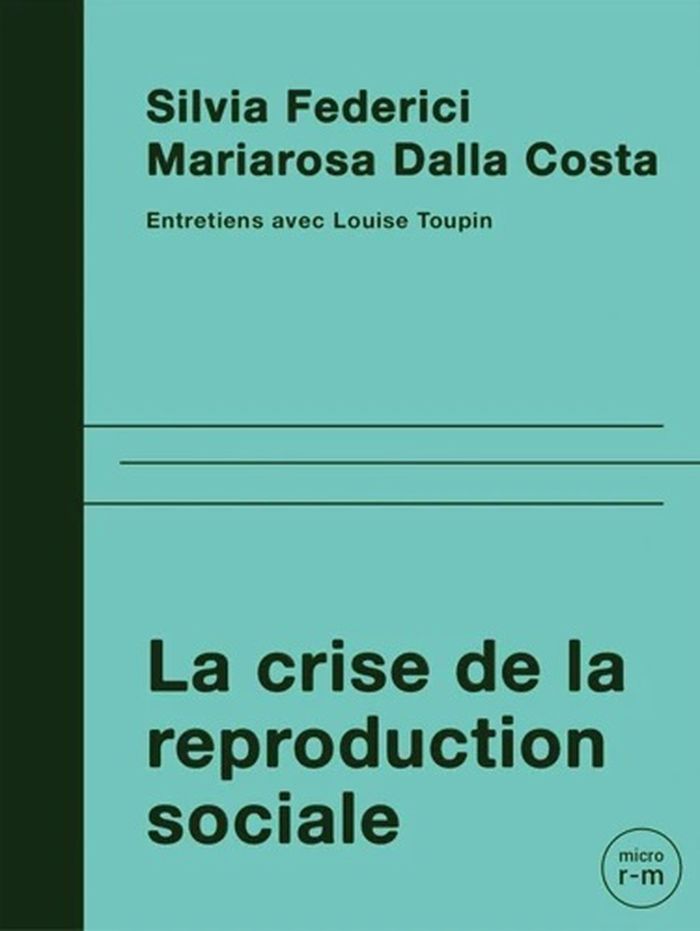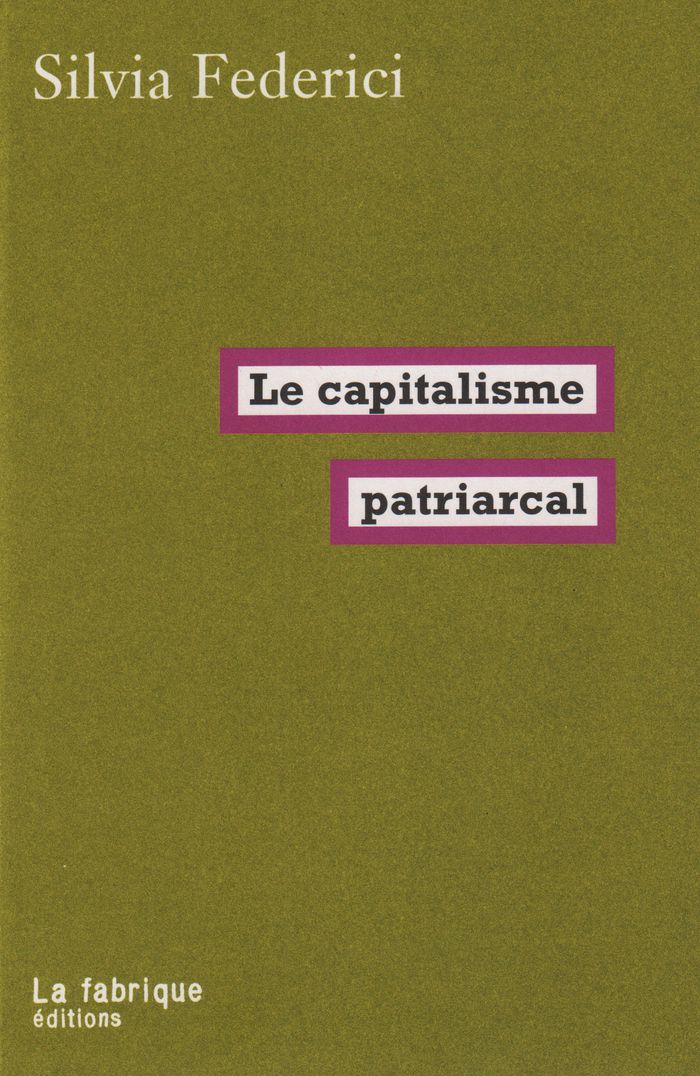Réenchanter le monde
$34.95
(disponible en magasin)
Résumé:
Silvia Federici examine dans « Réenchanter le monde » la politique des communs à travers une perspective puisant dans les luttes des femmes actuelles et passées autour de l'accès à la santé et aux soins reproductifs. Les mouvements de femmes actuels ainsi que les initiatives de groupes, communautés et peuples opprimés dans le monde proposent des alternatives collectives(...)
Réenchanter le monde
Actions:
Prix:
$34.95
(disponible en magasin)
Résumé:
Silvia Federici examine dans « Réenchanter le monde » la politique des communs à travers une perspective puisant dans les luttes des femmes actuelles et passées autour de l'accès à la santé et aux soins reproductifs. Les mouvements de femmes actuels ainsi que les initiatives de groupes, communautés et peuples opprimés dans le monde proposent des alternatives collectives et conviviales au mode d'organisation capitaliste. Agricultrices vivrières du monde et « tisseuses de mémoire », les femmes construisent partout de nouvelles économies politiques fondées sur l'action collective et des formes coopératives de reproduction sociale. Au cœur de leur stratégie se trouvent les communs.
Social
$9.95
(disponible en magasin)
Résumé:
Nées en Italie dans les années 1940, Silvia Federici et Mariarosa Dalla Costa sont des militantes pionnières et des intellectuelles féministes de premier plan. Dans ces entretiens avec Louise Toupin, elles reviennent sur le mouvement qu’elles ont cofondé en 1972, le Collectif féministe international, qui fut à l’origine d’une revendication radicale et controversée au sein(...)
La crise de la reproduction sociale
Actions:
Prix:
$9.95
(disponible en magasin)
Résumé:
Nées en Italie dans les années 1940, Silvia Federici et Mariarosa Dalla Costa sont des militantes pionnières et des intellectuelles féministes de premier plan. Dans ces entretiens avec Louise Toupin, elles reviennent sur le mouvement qu’elles ont cofondé en 1972, le Collectif féministe international, qui fut à l’origine d’une revendication radicale et controversée au sein du féminisme, celle de la rémunération du travail domestique. À partir de ce riche terreau, elles racontent comment s’est développée leur pensée au fil du temps, et formulent une critique intersectionnelle du capitalisme néolibéral, depuis la notion de crise de la reproduction sociale.
Social
$16.95
(disponible sur commande)
Résumé:
At a time when socialism is entering a historic crisis and we are witnessing a worldwide expansion of capitalist relations, a feminist rethinking of Marx’s work is vitally important. In ''Patriarchy of the wage,'' Silvia Federici, best-selling author and the most important Marxist feminist of our time, asks why Marx and the Marxist tradition were so crucial in their(...)
Patriarchy of the wage: notes on Marx, gender, and feminism
Actions:
Prix:
$16.95
(disponible sur commande)
Résumé:
At a time when socialism is entering a historic crisis and we are witnessing a worldwide expansion of capitalist relations, a feminist rethinking of Marx’s work is vitally important. In ''Patriarchy of the wage,'' Silvia Federici, best-selling author and the most important Marxist feminist of our time, asks why Marx and the Marxist tradition were so crucial in their denunciation of capitalism’s exploitation of human labour and blind to women’s work and struggle on the terrain of social reproduction. Why was Marx unable to anticipate the profound transformations in the proletarian family that took place at the turn of the nineteenth century, creating a new patriarchal regime? In this fiery collection of penetrating essays published here for the first time, Federici carefully examines these questions and in the process has provided an expansive redefinition of work, class, and class-gender relations. Seeking to delineate the specific character of capitalist “patriarchalism,” this magnificently original approach also highlights Marx’s and the Marxist tradition’s problematic view of industrial production and the State in the struggle for human liberation. Federici’s lucid argument that most reproductive work is irreducible to automation is a powerful reminder of the poverty of a revolutionary imagination that consigns to the world of machines the creation of the material conditions for a communist society.
Social
$14.95
(disponible sur commande)
Résumé:
Le 14 juin 2019 a eu lieu, en Suisse, la deuxième grève nationale des femmes. Ces quatre textes s'inscrivent dans ce contexte. L'invisibilisation du travail reproductif et gratuit fournit par les femmes est une des raisons de la colère qui s'exprime aujourd'hui. Les quatre textes regroupés dans cet ouvrage mettent en lumière l'enjeu de ce travail pour les luttes(...)
Travail gratuit et grèves feministes
Actions:
Prix:
$14.95
(disponible sur commande)
Résumé:
Le 14 juin 2019 a eu lieu, en Suisse, la deuxième grève nationale des femmes. Ces quatre textes s'inscrivent dans ce contexte. L'invisibilisation du travail reproductif et gratuit fournit par les femmes est une des raisons de la colère qui s'exprime aujourd'hui. Les quatre textes regroupés dans cet ouvrage mettent en lumière l'enjeu de ce travail pour les luttes féministes actuelles. Quels sont les usages de la grève hors du travail marchand ? Comment mener une grève du travail domestique, du travail gratuit ou du travail du sexe ? Une grève permet-elle de valoriser/visibiliser ce travail tout en le contestant ? Peut-on lutter contre le patriarcat sans lutter contre le capitalisme ?
Social
$18.95
(disponible sur commande)
Résumé:
Written between 1974 and 2012, ''Revolution at point zero'' collects forty years of research and theorizing on the nature of housework, social reproduction, and women’s struggles on this terrainto escape it, to better its conditions, to reconstruct it in ways that provide an alternative to capitalist relations. Indeed, as Federici reveals, behind the capitalist(...)
Revolution at point zero: Housework, reproduction, and feminist struggle
Actions:
Prix:
$18.95
(disponible sur commande)
Résumé:
Written between 1974 and 2012, ''Revolution at point zero'' collects forty years of research and theorizing on the nature of housework, social reproduction, and women’s struggles on this terrainto escape it, to better its conditions, to reconstruct it in ways that provide an alternative to capitalist relations. Indeed, as Federici reveals, behind the capitalist organization of work and the contradictions inherent in ''alienated labor'' is an explosive ground zero for revolutionary practice upon which are decided the daily realities of our collective reproduction. Beginning with Federici’s organizational work in the Wages for Housework movement, the essays collected here unravel the power and politics of wide but related issues including the international restructuring of reproductive work and its effects on the sexual division of labor, the globalization of care work and sex work, the crisis of elder care, the development of affective labor, and the politics of the commons.
Social
$21.95
(disponible sur commande)
Résumé:
Drawing on rich historical research, Silvia Federici maps the connections between the previous forms of enclosure that occurred with the birth of capitalism and the destruction of the commons and the "new enclosures" at the heart of the present phase of global capitalist accumulation. Considering the commons from a feminist perspective, this collection centers on women(...)
Re-enchanting the world: feminism and the politics of the commons
Actions:
Prix:
$21.95
(disponible sur commande)
Résumé:
Drawing on rich historical research, Silvia Federici maps the connections between the previous forms of enclosure that occurred with the birth of capitalism and the destruction of the commons and the "new enclosures" at the heart of the present phase of global capitalist accumulation. Considering the commons from a feminist perspective, this collection centers on women and reproductive work as crucial to both our economic survival and the construction of a world free from the hierarchies and divisions capital has planted in the body of the world proletariat. Federici is clear that the commons should not be understood as happy islands in a sea of exploitative relations but rather autonomous spaces from which to challenge the existing capitalist organization of life and labor.
Théorie/ philosophie
Le capitalisme patriarcal
$27.95
(disponible en magasin)
Résumé:
Comment faire tourner les usines sans les travailleurs vigoureux, nourris, blanchis, qui occupent la chaîne de montage ? Loin de se limiter au travail invisible des femmes au sein du foyer, Federici met en avant la centralité du travail consistant à reproduire la société : combien couterait de salarier toutes les activités procréatives, affectives, éducatives, de soin et(...)
Le capitalisme patriarcal
Actions:
Prix:
$27.95
(disponible en magasin)
Résumé:
Comment faire tourner les usines sans les travailleurs vigoureux, nourris, blanchis, qui occupent la chaîne de montage ? Loin de se limiter au travail invisible des femmes au sein du foyer, Federici met en avant la centralité du travail consistant à reproduire la société : combien couterait de salarier toutes les activités procréatives, affectives, éducatives, de soin et d’hygiène aujourd’hui réalisées gratuitement par les femmes ? Que resterait-il des profits des entreprises si elles devaient contribuer au renouvellement quotidien de leur masse salariale ?
Théorie/ philosophie
Caliban et la sorcière
$45.95
(disponible sur commande)
Résumé:
Silvia Federici revisite ce moment particulier de l'histoire qu'est la transition entre le féodalisme et le capitalisme, en y introduisant la perspective propre à l'histoire des femmes. Elle nous invite à réfléchir aux rapports d'exploitation et de domination, à la lumière des bouleversements introduits à l'issue du Moyen Âge. Un monde nouveau naissait, privatisant les(...)
Caliban et la sorcière
Actions:
Prix:
$45.95
(disponible sur commande)
Résumé:
Silvia Federici revisite ce moment particulier de l'histoire qu'est la transition entre le féodalisme et le capitalisme, en y introduisant la perspective propre à l'histoire des femmes. Elle nous invite à réfléchir aux rapports d'exploitation et de domination, à la lumière des bouleversements introduits à l'issue du Moyen Âge. Un monde nouveau naissait, privatisant les biens autrefois collectifs, transformant les rapports de travail et les relations de genre. Ce nouveau monde, où des millions d'esclaves ont posé les fondations du capitalisme moderne, est aussi le résultat d'un asservissement systématique des femmes. La transition vers le capitalisme faisait de la modernité une affaire de discipline. Discipline des corps féminins dévolus à la reproduction, consumés sur les bûchers comme autant de signaux terrifiants, torturés pour laisser voir leur mécanique intime, anéantis socialement. Discipline des corps d'esclaves, servis au mouvement d'accaparement des ressources du Nouveau Monde pour la fortune de l'ancien. Le capitalisme contemporain présente des similitudes avec son violent passé. Ce qu'on a décrit comme barbarie et dont aurait su triompher le siècle de la raison est constitutif de ce mode de production : l'esclavage et l'anéantissement des femmes n'étaient pas fortuits, mais une nécessité à l'accumulation de richesse.
Théorie/ philosophie







